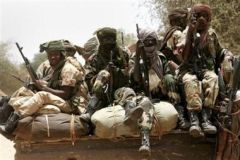Security Council appeals to Chad, Sudan to halt border violations
April 26, 2006 (UNITED NATIONS) — The U.N. Security Council appealed to the leaders of Chad and neighboring Sudan on Tuesday to halt border violations and refrain from destabilizing each other’s country, expressing deep concern at the deteriorating relations between the African nations.
 In a presidential statement adopted by consensus, the council also called for a political dialogue and negotiated solution to the continuing crisis within Chad, where the country’s main opposition alliance in boycotting the scheduled May 3 presidential election.
In a presidential statement adopted by consensus, the council also called for a political dialogue and negotiated solution to the continuing crisis within Chad, where the country’s main opposition alliance in boycotting the scheduled May 3 presidential election.
The council statement was the first response to the unsuccessful rebel attack on Chad’s capital, N’djamena on April 13.
The council strongly backed the African Union’s condemnation of the attack and endorsed Secretary-General Kofi Annan’s statement expressing deep concern at the political situation and instability along the Chad-Sudan border and “the possible spillover effects of these crises on neighboring countries and the entire region.”
The African Union sent a fact-finding mission on Friday to look into Chad’s claims that Sudanese-backed mercenaries and a small number of Chadian rebels attacked N’djamena, killing at least 350 people. Sudan has denied any involvement and accuses Chad of backing a different rebel group in its western Darfur region where a three-year conflict has killed at least 180,000 people.
The Security Council welcomed the mission and said it looks forward to its conclusions.
In the meantime, it urged the Sudanese and Chadian governments to abide by the peace agreement they signed in Tripoli, Libya, on Feb. 8 in which they pledged to normalize diplomatic relations and deny refuge to each other’s rebel groups.
In the agreement, Chadian President Idriss Deby and Sudanese President Omar el-Bashir also pledged to work to prevent the presence of rebels on each other’s territory.
Without naming any country but implicitly referring to Chad and Sudan, the council called on all U.N. members “to refrain in their international relations from the threat or use of force against the territorial integrity or political independence of any state.”
France’s U.N. Ambassador Jean-Marc de La Sabliere said the presidential statement “underlines how much the council is concerned by this situation between Sudan and Chad.”
“The territory of one country cannot be used to destabilize another country,” he said, “and it is of utmost importance that both countries abide by the commitment they have taken in Tripoli.”
Chad, an arid, landlocked country about three times the size of California, has been wracked by violence for most of its history, with more than 30 years of civil war since independence from France in 1960 and different small-scale insurgencies since 1998.
The rebel attack underscored concerns that the civil war in Darfur has undermined Deby’s authority and destabilized the entire region. It also showed how little control Deby wields in the countryside, where rebels cruise the desert at will.
Deby broke diplomatic relations with Sudan a day after the rebel attack and threatened to expel 200,000 Sudanese refugees from Darfur, but backed down after pleas from the United Nations and the United States.
The Security Council urged the Chadian government to continue supporting the efforts of humanitarian and relief agencies and called on donors to provide additional funds for the emergency humanitarian situation in both Chad and Sudan.
(ST/AP)
